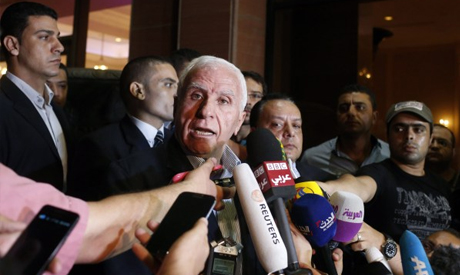
Fatah official and delegation leader Azzam Ahmed talks to journalists about a new agreement to extend a truce for five more days, outside a hotel in Cairo August 13, 2014 (Photo: Reuters)
In what the various parties involved have described as a difficult and complex process, the second round of indirect negotiations in Cairo between the Palestinians and Israelis resumed in tandem with a temporary 72-hour truce brokered by Cairo.
These developments are indicative of a shared desire not merely to subdue the crisis with palliatives but rather to produce an effective remedy that can work over the long term. After the expiration of such truce, Egypt successfully managed to broker a new ceasefire for five days.
The Israeli delegation left Cairo Monday after a long day of negotiations. It was due to return back the following day, after having obtained answers to a number of questions from the Israeli cabinet. The Israeli delegation includes Shin Bet chief Yoram Cohen, director of policy and political-military affairs in the Israeli Ministry of Defence, Amos Gilad, the special envoy of the Israeli prime minister, Yitzhak Molcho, the coordinator of government operations in the regions, Yoav Modrichai, and the head of the planning division in the Israeli army, Nimrod Sheffer.
This time talks made some progress, if only half way. A source that accompanied the head of the Hamas contingent in the Palestinian delegation told Al-Ahram Weekly that as arduous as the talks are, they brought a qualitative shift this time. He noted that the answers to some of the demands were clearer, but that other demands would require more extensive discussion. Still, he did not rule out the possibility of reaching a Cairo declaration during the second truce, or an extension of the truce beyond midnight Wednesday and into Thursday morning.
Yedioth Ahronoth reported that Israel would agree to transfer salaries earmarked for government employees in Gaza via a third party. It has already agreed to expand the area for fishing off the coast of Gaza to six miles, and to allow building materials into Gaza, albeit under strict supervision. Israel is also expected to approve a significant increase in the number of trucks permitted to pass into Gaza through the Karam Abu Salem crossing. The number could rise to 600 per day.
The Palestinians have rejected the Israeli demand for the disarmament of the Palestinian factions.
According to the same journalistic source, Israel will increase the number of entry permits through the Beit Hanoun (Erez) crossing and it will expand the criteria for issuing permits to inhabitants in Gaza to enter Israel and the West Bank.
Yedioth Ahronoth observed that an agreement has not yet been reached on the question of the Gaza seaport. However, it also reported that authorities from Hamas have indicated that it would be possible to defer the questions of the seaport and airport if Israel agreed to the rest of the demands. In that event, however, these sources want an Israeli agreement in principle on a Gaza airport and seaport. According to the newspaper, Israel continues to oppose the opening of a seaport or airport in Gaza on the grounds that the Palestinian factions would use them to smuggle in weapons and combat equipment.
It is noteworthy, in this regard, that former head of Israeli military intelligence Amos Yadlin said a few days ago that it would be possible to create a seaport with the stipulation that it be a civil port and closely monitored. He noted that it would take four years to build and that Israel had given its approval for constructing one in the era of President Yasser Arafat.
According to Yedioth Ahronoth, the Egyptians and Palestinians are inclined to hand responsibility for the Rafah border crossing to security forces under the Palestinian Authority (PA). An Egyptian source told the Weekly that Cairo is committed to the framework of the PA’s administration of the crossing on the Palestinian side, or to return to the 2005 agreement on the crossing, although the first option is the most likely to prevail. He added that while Egypt currently opens the crossing under exceptional circumstances, the return of the PA would ensure that it would remain open permanently.
With regard to a long-term truce that both sides seek and Cairo supports, as the situation stands it will probably be established but not backed by guarantees from both sides. “Hostilities could erupt again at any time,” said Emad Gad, who heads the Israeli Affairs Unit in Al-Ahram Centre for Political and Strategic Studies. “Hamas has prioritised [Islamist] ideology over the Palestinian national and political project, while Israel has undermined all serious attempts to promote a settlement process in any direction, and it has squandered many opportunities.”
Also on Monday, the Israeli news website Walla reported, citing a knowledgeable source, that Hamas has insisted on designating a financial mechanism in which Qatar would help with the reconstruction of Gaza. However, due to Cairo’s anxieties over the growing influence of Qatar in Gaza, Egypt turned instead to Saudi Arabia and other Gulf countries for the Gaza reconstruction project. The source cited by Walla observed that this would weaken the influence of Qatar and the Hamas leadership over developments in Gaza. The source said that Saudi Arabia has explicitly insisted on assurances that its financial aid would be channelled into improving conditions of life for the Palestinian people in Gaza, and not into digging tunnels and strengthening Hamas’s military capacities.
In Cairo, Assistant Foreign Minister Mohammed Badr El-Din told the Weekly that he would be taking part, this week, in a conference on Gaza in Saudi Arabia. He offered no further details apart from adding that the conference was part of “efforts to sort out that question.”
*This story was first published at Al-Ahram Weekly.
Short link: